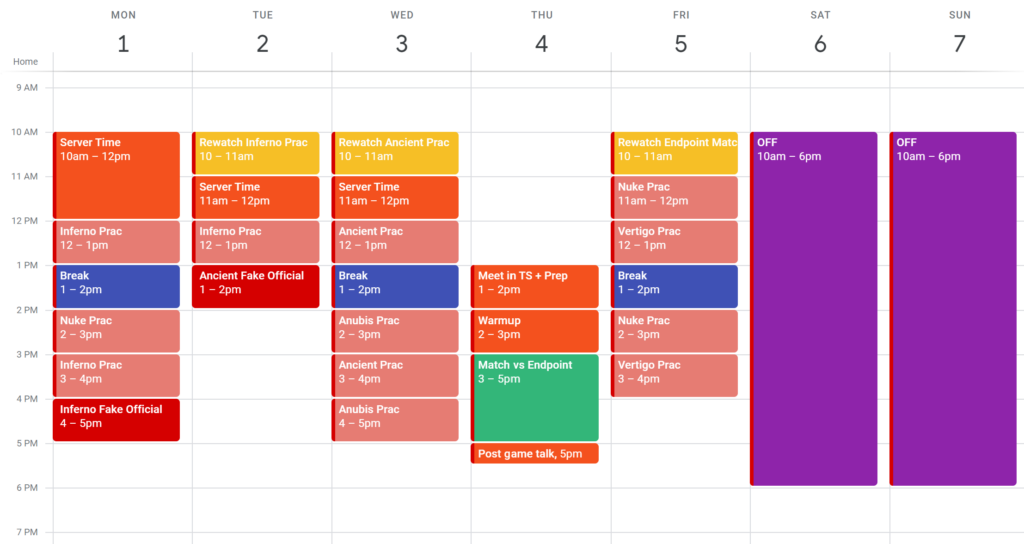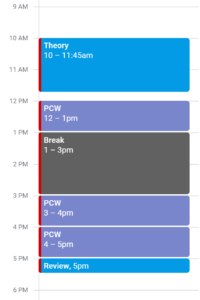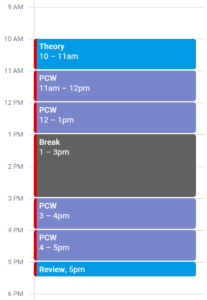Planning your schedule is the first step towards making the most of the time available to your team. Some of the examples below mirror those of professional squads with full flexibility to practise at any time, whereas, your team may need to juggle other commitments like working or studying. In these cases, use the below examples as inspiration, look at why something is scheduled a certain way rather than simply copying and pasting.
One word of warning: burnout. Be realistic. You need to have off days and only in extreme cases should a team be playing for days on end. Everyone needs to weigh in when choosing the rough format of your schedule, especially for a new team. We recommend using these examples to come up with your own potential schedules, before getting the thoughts of all your players. The more inexperienced you are as a team, the more trial and error it will take to nail down the right schedule for you.
Google calendar is a great tool to use for scheduling, or a simple spreadsheet will also suffice. Simplicity is king when it comes to aspects like these.
Ash’s Example Schedule

General rules to follow:
- The aim is to have 4 practice games per day, and to vary the length of the day overall depending on how much there is to talk about. On full days, focus on either 1 map per day and play this 3 times, or 2 maps per day and play them both twice.
- Use the days off as time to dream up ideas/strategies/setups etc. into having 2 hour server time blocks. Later in the week you can drop down to 1 hour of server time when there are fewer ideas to talk through.
- Try to record practice games with the teamspeak communication and every so often treat one game as a fake official. Use your recordings to analyse these fake officials and find focus points to address during future practice games.
- Do not attempt to play in blocks longer than 3 hours to maintain a higher level of focus.
- On days with officials meet 1-2 hours before the start time to discuss your gameplan and any individual focus points. Players should be awake and warmed up before this meet time, this is not a wake up time.
- It is each individual’s responsibility to bring energy and a good mood to the practice games.
Max’s Example Schedules
Theory Heavy Day

Theory 10am → 12pm
- Focus on one map during the theory time.
- You have a 2 hour window to allow time for theorycrafting, discussion, review, dry runs, new rounds etc.
- Discussions should be constructive and any reviews should be done together as a team.
- E.g. Stream a demo review on discord.
- E.g. Have individuals bring their own ideas from demos and then collectively watch/talk about them.
- Create focus points for the team and individuals.
- Example team focus: we are going to run this set anti-force round.
- Example individual focus: I’m going to focus on my communication.
- Take a break before the first practice starts (at perhaps 11:45).
- Individual warmup is encouraged during this time.
PCW’s 12pm, 3pm & 4pm
- All players need to remain focused on their goals/focus points they set at the start of the day.
- PCW 1 – Play the map you went over in the theory time and make sure everyone knows their focus points before you start
- PCW 2 – Again is the map you went over in theory.
- PCW 3 – The map is optional, you can play the same map or play a different map. The benefit of playing a different map is that you lessen the chance of neglecting to play certain maps in your practice schedule. (PCW’s 2 & 3 can be reversed depending on PCW availability)
Break 1pm → 3pm
- It is completely optional to take a 1 or 2 hour break, we find that 2 hours works well for us.
- You can quickly review any notes or highlighted aspects from the first PCW at the start of the break.
- The team should meet 15 minutes before the practice starts to ensure you can refocus, and make any adjustments before playing.
Review 5pm → 5:30pm
- Take a small break after the last practice, then meet as a team to discuss any key notes made during the practice day.
- Discussion & evaluation of the practices is encouraged here. E.g. Did we meet the individual & team focus points for the practices?
Practice Heavy Day

Theory 10am → 11am
- 1 hour of theory time, addressing key notes or focusing on adding small things.
- It is best to address only 1 map, but you can squeeze in 2 if you go over things quickly.
- Remember to discuss individual and team focus points for the day.
- Take a small break before practice starts to individually warmup.
PCW’s 11am, 12pm, 3pm & 4pm
- Practise the maps you have looked at during theory time.
- If you have only gone over 1 map then I recommend playing it at least twice during the day, with the other practices being on other maps.
With the Break and Review slots, everything is exactly the same as on the theory heavy day.
Allan’s Example Schedule
The examples above from Max and Ash would act as a great basis for any schedule, especially if you have full days available to your team. But what if you can only practise during the evenings? Let’s talk through the schedule of our favourite team: Team A.

On weekdays, the earliest Team A can start is 5:30pm. We love Fred, he’s great at playing Pit on Inferno, but his 5v5 football matches means Wednesday is off limits. Nevertheless, Team A still fits in 4 practice days, with a good amount of off time.
Monday. Team A always starts their week with a quick meeting, they open up their document and agree upon the big focus points for the week, whilst getting every player to pick some individual aspects to work on. With an upcoming ESEA game, Team A planned ahead and thought it would be on Inferno or Mirage. Inferno needed less work, and a 1 hour theory session on the server into 2 scrims was perfect. Mirage however needed a CT overhaul. Team A reworked the CT spots and ended on Monday by splitting into their CT sites (3A, 2B), then watched demos together on discord and noted down loads of brand new ideas.
Tuesday was Mirage D-Day, a quick recap on the T-side on top of yesterday’s demo reviews and they were good to go. In this first scrim, team A ran all their new CT ideas rather than trying to win. Team A has a great coach who records every game, and after this scrim, everyone watched back the CT gun rounds to see what needed tweaking. Following a short break, team A had two scrims to really nail down Mirage, the adjustments were working great and even Fred enjoyed playing B Apps. To end the day, Team A took some time to reflect on Mirage, they looked at their map specific focus points and updated them with which issues to tackle next.
Thursday, gameday. Team A always tries to be online 90 minutes before matches. It’s hard to prepare for ESEA games, so they focus more on themselves. The IGL and Coach talk over the big picture gameplans for Inferno and Mirage, whilst the individuals look up their personal notes, double check their nades and go over all the key setups/plays with their site partners. The Match rolls around and their opponents pull a fast one and send it to Vertigo. It was a disaster, Fred got double naded almost every round. Although it was rough, Team A did not want to waste the rest of the evening. After watching the game back the mistakes were obvious and Team A wrote down all the aspects which needed addressing.
Sunday. Vertigo had to be fixed. With the match review still on their mind, Team A knew they needed to inject some new ideas. They decided to split off individually and each watch some Vertigo demos, every player had to find 2 CT setups/plays and 2 Terrorist default ideas which related directly to their positions. Team A then spent the next hour letting each player showcase their new ideas, whilst everyone learnt the new nades and plays. With 2 scrims to test out all these fresh ideas, Team A quickly narrowed down to the ones they liked best. Team A also likes to end every week with a longer meeting to reflect on their progress. Each player gets their chance to say what is and what is not working, everyone is respectful and they use this feedback to choose new focus points. After a few minutes agreeing on the rough schedule for the following week, everyone signs off for the evening and Fred reflects on his week of playing.
Fred is not a professional player, sometimes he even misses his Mirage stairs smoke, but Fred gets a lot out of his team’s great schedule. The two meetings teach him how to communicate properly with his teammates and plan ahead, the coach’s recordings allow him to tweak his play before making the same mistakes in officials, and having clear focus points helps him always refine himself as an overall package.
Fred is likely to improve much faster than anyone on the average squad around Team A’s level, and when Fred gets his shot with a higher level team, they’re blown away by his attitude and awareness. After a few weeks in his new squad, Fred suggests they schedule in a similar manner to team A, and the rest is history.
You can find all the assets used in this resource here.

